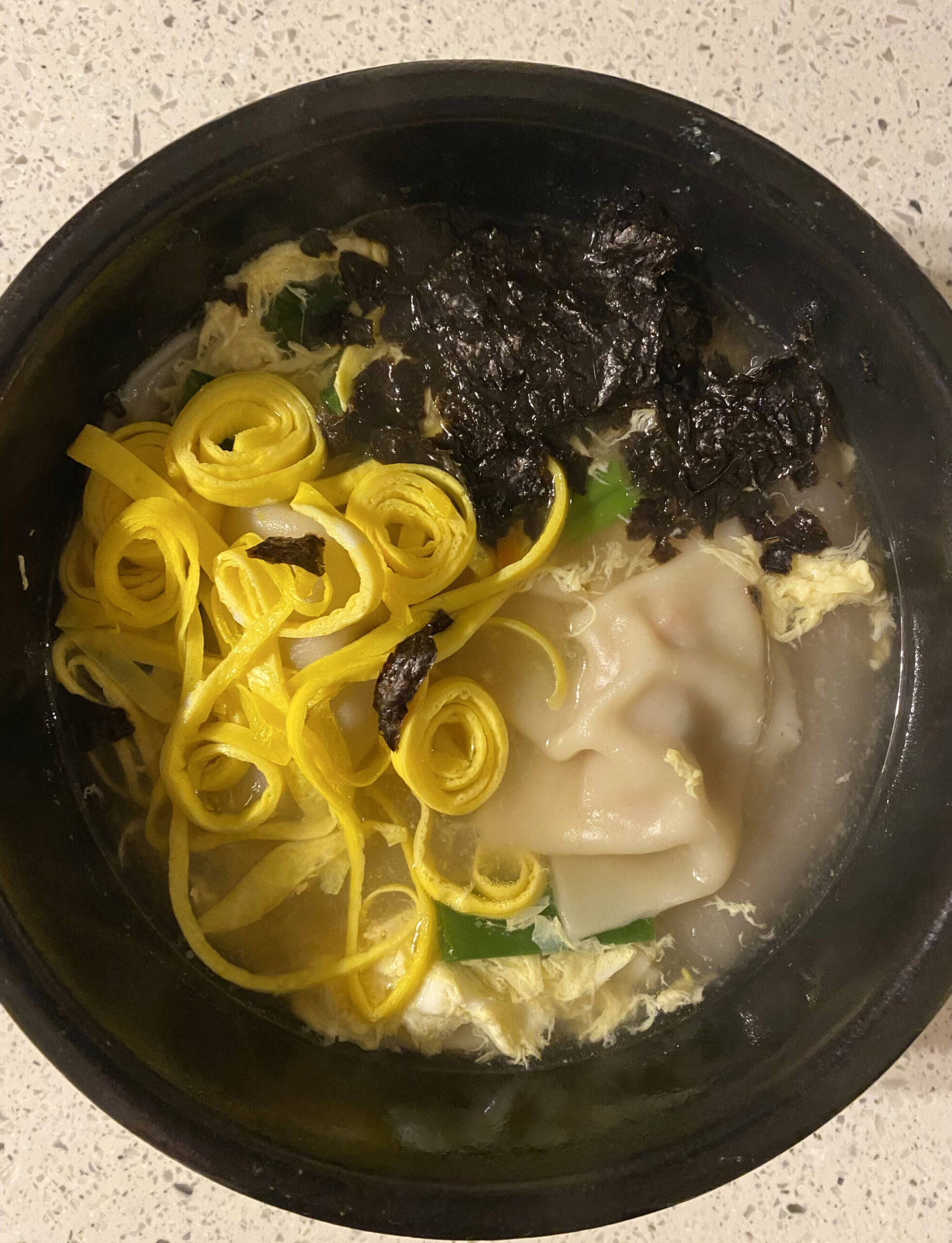Saturday the 10th is the Lunar New Year — the beginning of the year of the dragon, the only mythological creature on the Chinese calendar.
If you were born in 1928, 1940, 1952, 1964, 1976, 1976, 1988, or 2000, you are a dragon. Dragons are thoughtful and wise, powerful, lucky, but also vengeful, and fiercely competitive. Because dragons are said to control the weather, the weather on the day of the New Year can predict the outcome of the year ahead — so let’s all hope for clear skies and mild temperatures on Saturday.
In Korea, the Lunar New Year is one of the major holidays, and families gather to cook and play games over a long weekend. Typical holiday meals include rice cake soup, braised beef short ribs, potato starch noodles, dumplings, soups, fried pancakes, and sweet filled rice cakes steamed on a bed of pine needles.
For our celebration, I decided to make dumpling soup (mandu-guk) with some handmade dumplings. As I always do when I make dumplings, I made a large batch and froze the remainder.
Mandu-guk (Dumpling Soup)
Ingredients:
1 package gyoza wrappers
1 pound ground meat (pork, beef, chicken, turkey, or crumbled extra-firm tofu)
6 cloves garlic, finely minced plus 2 chopped stalks for garnish
2 inches fresh ginger, finely minced
6 stalks green onion, finely minced
1 medium carrot, chopped fine
4 eggs
A few sheets of roasted nori, crushed
1 quart stock (complimentary to the “meat” choice)
2 teaspoons fish sauce
½ teaspoon black pepper
½ teaspoon salt
2 teaspoon sesame oil
Directions:
Make your dumpling filling by combining the ground meat, garlic, ginger, green onion, carrot, salt and black pepper.
Remove the wrappers from the package and cover in a damp paper towel to keep them from drying out while you work.
Prepare a small bowl of water to dip your fingers into.
Line a large tray with parchment paper (to keep them from sticking while freezing) as a landing zone for your finished dumplings.
Place a wrapper in your hand and scoop a small amount of filling into the center. About a teaspoon per dumpling.
Using a wet finger, wet half of the outer edge of the wrapper, then fold so the edges meet.
Press the edges closed, being sure to push out as much air as possible while you do, until the dumpling is sealed.
Pinch and fold the edges over three times to make a pretty dumpling.
Continue until all the wrappers have been used, or all the filling is gone. (I ended up with about ½ cup leftover filling, which I used the next day to make fried rice for lunch.)
Whisk two of the eggs in a small bowl.
Lightly grease a large, nonstick pan with oil, heat over high heat until hot, then turn off the heat before pouring the eggs into the hot pan. Swirl like you would crepe batter until the whole bottom of the pan is covered.
Allow to cook until opaque then flip. Remove after 1 minute, roll, and slice for garnish.
Pour the stock and fish sauce into a soup pot and heat until steaming but not boiling.
Drop in your dumplings — about 5-6 per person and let them cook until they float. You may want to stir them very gently to keep them from sticking to the bottom. Don’t let the soup boil or the dumplings might fall apart.
When all the dumplings are floating, take one out to check for doneness. Make sure the meat is cooked before continuing.
Whisk the other two eggs in a small bowl.
Turn the heat off, stop stirring, and drizzle the egg into the hot broth. Wait 20 seconds before stirring.
Taste the broth and season with extra salt, pepper, fish sauce, red pepper flakes, or soy sauce.
Ladle out into wide bowls and top with the egg paper garnish, roasted seaweed, green onion, and a drizzle of sesame oil.
Serve with kimchi.

